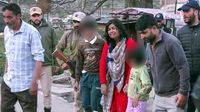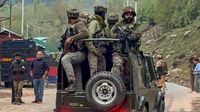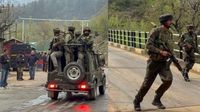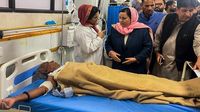In a shocking act of violence, The Resistance Front (TRF), a Pakistan-backed terrorist outfit, has claimed responsibility for a brutal attack on tourists in the picturesque Baisaran meadows of Pahalgam, Jammu and Kashmir. The attack, which occurred on Tuesday, April 22, 2025, left at least 26 people dead, including two foreign nationals, and injured several others, marking one of the deadliest incidents involving civilians in the region since the 2019 Pulwama attack.
The assault unfolded around 2:30 PM, when unidentified gunmen opened fire on a group of tourists enjoying their day in the scenic meadow, which is known for its lush landscapes and proximity to popular tourist activities. Eyewitnesses reported that the attackers targeted unarmed individuals who were picnicking, riding ponies, or dining at local stalls. The chaos that ensued left many in shock, with emergency services quickly mobilizing to transport the injured to nearby hospitals.
The TRF, which was formed in October 2019 following the revocation of Jammu and Kashmir's special status under Article 370, has been labeled a terrorist organization by the Indian government. The group is believed to be an offshoot of the notorious Lashkar-e-Taiba (LeT) and has been implicated in numerous attacks aimed at civilians, security forces, and local politicians. In January 2023, the Indian government officially banned the TRF under the Unlawful Activities (Prevention) Act (UAPA), highlighting its role in inciting violence and recruiting youth for militant activities.
Following the attack, Jammu and Kashmir Chief Minister Omar Abdullah expressed his shock and outrage, describing the incident as “an abomination.” He conveyed his condolences to the families of the victims and emphasized the need for a thorough investigation to bring the perpetrators to justice. “I send my sympathies to the families of the deceased. This attack on our visitors is an abomination,” Abdullah stated on social media.
In a statement released after the attack, TRF claimed that their actions were a response to the issuance of over 85,000 domiciles to non-locals, suggesting that these individuals were encroaching on land in Jammu and Kashmir. The group stated, “These non-locals arrive posing as tourists, obtain domiciles, and then begin to act as if they own the land. Consequently, violence will be directed toward those attempting to settle illegally.” This rhetoric underscores the group's narrative that seeks to frame their violent actions as a form of resistance.
The attack has raised significant concerns about security in the region, particularly as the Amarnath Yatra pilgrimage approaches, a time when tourist activity typically surges. Union Home Minister Amit Shah arrived in Srinagar shortly after the incident to assess the situation and chair a high-level meeting with top security officials. Shah is also expected to visit Pahalgam to evaluate the security protocols in place.
Prime Minister Narendra Modi condemned the attack, expressing his condolences to the victims' families and urging that all possible assistance be provided to those affected. “I strongly condemn the terror attack in Pahalgam, Jammu and Kashmir. Condolences to those who have lost their loved ones. I pray that the injured recover at the earliest,” Modi wrote on social media.
The TRF has been involved in various high-profile attacks since its inception, including the deadly Ganderbal construction site shooting in October 2024, which resulted in the deaths of seven individuals. The group’s operations are believed to be supported by Pakistan's Inter-Services Intelligence (ISI), which aims to sustain unrest in the region and divert international attention from Pakistan's own internal issues.
Security forces have intensified their operations in the region following the Pahalgam attack, with checkpoints established at all exit points to prevent the assailants from escaping. Investigations are ongoing, and authorities are working diligently to gather intelligence on the group’s movements and potential future threats.
The TRF's emergence has been characterized by its use of modern technology and social media to recruit and radicalize individuals. The group has maintained a strong online presence, utilizing platforms like Telegram and WhatsApp for propaganda and recruitment purposes. This strategy allows them to engage with potential recruits and spread their ideology more effectively.
While the TRF attempts to present itself as a local resistance movement, its connections to established terrorist organizations like the LeT raise serious questions about its true objectives. The Indian government has reiterated its commitment to combating terrorism and ensuring the safety of its citizens, emphasizing that such acts of violence will not be tolerated.
The Pahalgam attack serves as a grim reminder of the persistent threat posed by militant groups in the region and the challenges faced by security forces in maintaining peace and stability. As the investigation unfolds, the focus will remain on preventing further attacks and protecting the lives of both locals and visitors to Jammu and Kashmir.
Political leaders across the spectrum have condemned the attack, with Defence Minister Rajnath Singh calling it an act of cowardice and expressing his anguish over the loss of innocent lives. Former Jammu and Kashmir Chief Minister Mehbooba Mufti also condemned the violence, emphasizing the need for a thorough investigation and accountability for the perpetrators.
As the region grapples with the aftermath of this tragic event, it is crucial for the government to take decisive action to ensure the safety of its citizens and restore confidence among tourists who contribute significantly to the local economy. The ongoing violence not only disrupts the lives of those directly affected but also poses a threat to the broader narrative of peace and stability that Jammu and Kashmir has long sought to achieve.






